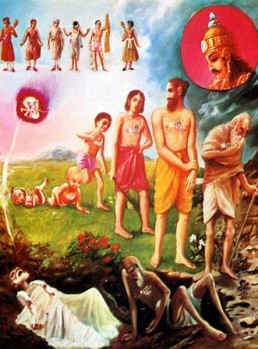Swami Chinmayananda
Swami Chinmayananda Commentary
Calm endurance, both in pleasure and pain, is a condition necessary for right knowledge of the true Self; this is the technique of Self-realisation, as explained in the Upanishadic lore. Based upon that fact, here Lord Krishna explains that one who has found in himself a mental equipoise, wherein he is not afflicted or disturbed by circumstances of pain and pleasure, he alone “IS FIT FOR ATTAINING IMMORTALITY.”
When the TRANSCENDENTAL TRUTH or the ETERNAL PERFECTION has been indicated by the term Immortality, the term is not used in its limited sense of ‘deathlessness’ of the body. Here the term ‘death’ not only indicates the destruction of the physical embodiment but also includes and incorporates within its significance, the entire range of finite experiences, where, in each one of them, there is an extinction-experience. No experience gained through either the body, or the mind, or the intellect is permanent.
In other words, each experience is born to live with us for a short period and then to die away in us. These chains of finite experiences stretch out in front of us as the paths of sorrow and pain in our life. The term ‘Immortality,’ used by the Rishi to indicate the ‘Supermanhood,’ indicates a state wherein one, walking the path of endless sorrows, as the individual ego, transcends that state to attain the Infinite experience of THE ETERNAL AND THE PERMANENT.
Through the Geeta, our poet-seer Vyasa is making Lord Krishna declare that the purpose of life for every one is the attainment of PERFECTION, and to evolve oneself to it one must make use of every little chance in one’s allotted span of life. To endure meekly, with magnanimous joy, the little pin-pricks of life — heat and cold, success and failure, pain and joy — is the highest training that life can provide to all of us.
An incompetent idler’s hapless endurance of life, is not in itself what is indicated here. It is especially said that the equipoise of the mind, both in pleasure and sorrow, entertain by a “wise man” (Dheerah) makes him fit for the highest cultural self-development. That is to say, the equanimity should not flow from the dark caves of one’s stupidity and inertia, but it must gurgle forth from the open sunny fields of wisdom and understanding. When one understands the essential nature of the objects-of-the-world to be finite, out of that realised knowledge one gains enough balance for calm endurance and does not feel exalted in pleasure nor dejected in pain.
So long as we live in the body, as the body, we are not able to ignore or calmly endure the sorrows of the body. But, when we are fired by a sentiment of love or hatred, we invariably make ready sacrifices of bodily pleasures. Because of my love for my son, I am ready to make any sacrifice of my physical needs, so that I may give him a good education, etc. When, intellectually, one gets fired by some idea or ideology, for the satisfaction of it, one readily ignores and overlooks the comforts and pleasures of one’s body and mind. The martyrs and revolutionaries in the world could, with pleasure, face physical persecutions and mental agonies for the satisfaction of their intellectual lives and for the fulfilment of their ideals and ideologies.
FOR THE FOLLOWING REASONS ALSO, IT IS PROPER THAT YOU SHOULD ABANDON YOUR GRIEF AND DISTRESSING DELUSION AND SHOULD CALMLY ENDURE HEAT AND COLD, ETC. FOR:
Adi Sankara Commentary
What will happen to one who bears cold and heat? Listen: Verily, the person…,’etc. (O Arjuna) hi, verily; yam purusam, the person whom; ete, these, cold and heat mentioned above; na, do not; vyathayanti, torment, do not perturb; dhiram, the wise man; sama-duhkha-sukham, to whom sorrow and happiness are the same, who is free from happiness and sorrow when subjected to pleasure and pain, because of his realization of the enternal Self; sah, he, who is established in the realization of the enternal Self, who forbears the opposites; kalpate, becomes fit; amrtattvaya, for Immortality, for the state of Immortality, i.e. for Liberation.
The Bhagavad Gita with the commentary of Sri Sankaracharya – Translated by Alladi Mahadeva Sastry
Holy Geeta – Commentary by Swami Chinmayananda
The Bhagavad Gita by Eknath Easwaran – Best selling translation of the Bhagavad Gita
The Bhagavad Gita – Translation and Commentary by Swami Sivananda
Bhagavad Gita – Translation and Commentary by Bhaktivedanta Swami Prabupadha
Srimad Bhagavad Gita Chapter 2 – Verse 15 – 2.15 yam hi na vyathayantyete – All Bhagavad Gita (Geeta) Verses in Sanskrit, English, Transliteration, Word Meaning, Translation, Audio, Shankara Bhashya, Adi Sankaracharya Commentary and Links to Videos by Swami Chinmayananda and others – 2-15

